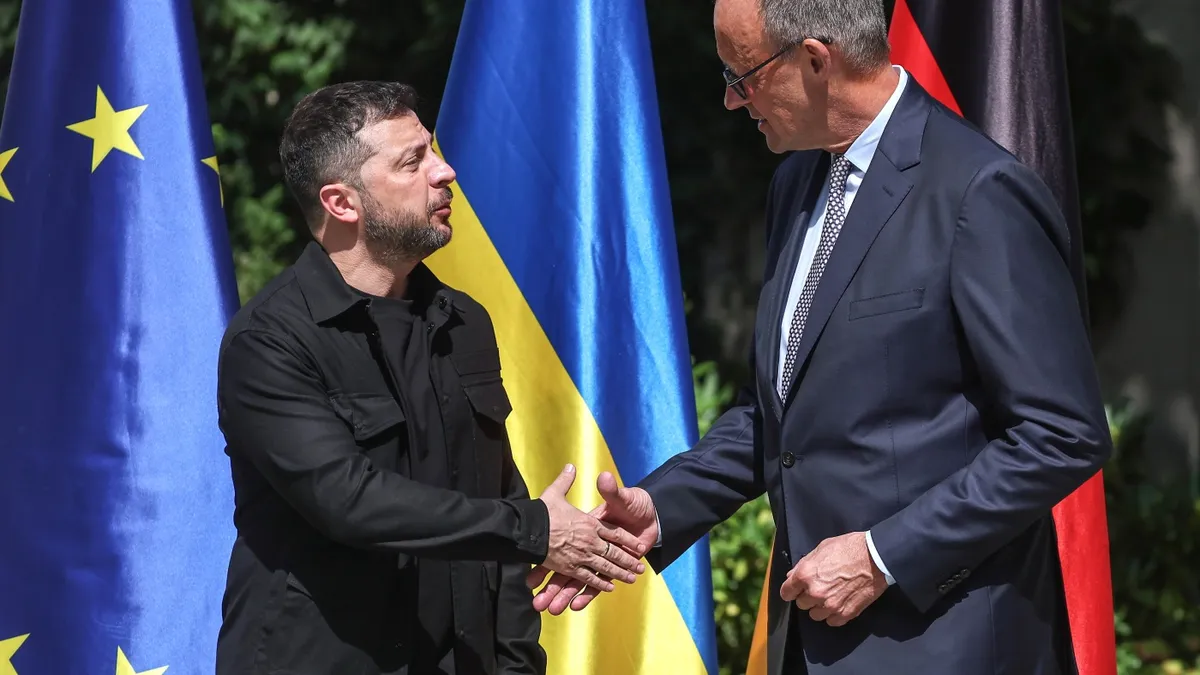
In a significant diplomatic move, Ukraine's President Volodymyr Zelenskyy has arrived in Berlin ahead of a series of high-stakes European summits scheduled for Wednesday. This visit comes at a crucial time as European leaders aim to bolster their support for Ukraine amid ongoing tensions with Russia.
Upon his arrival, Zelenskyy was welcomed by German Chancellor Friedrich Merz. The upcoming meetings are pivotal, particularly as they aim to strengthen Ukraine's position in the face of increasing aggression from Russia and to strategize on how to engage with President Donald Trump before his anticipated meeting with Russian President Vladimir Putin on Friday.
In a forward-looking statement posted on Truth Social, President Trump indicated his intention to speak with European leaders shortly. "They are great people who want to see a deal done," he wrote, hinting at his desire for diplomatic resolutions amidst the ongoing conflict.
Despite these diplomatic efforts, there is a prevailing sense of skepticism in Finland, which shares an 830-mile border with Russia. Finnish Foreign Minister Elina Valtonen expressed a lack of optimism regarding the success of these negotiations. "Putin has no intention to stop his expansionist pursuit," she stated in a post on X.
The upcoming Trump-Putin meeting marks the first between a U.S. president and the Russian leader since the onset of Russia's full-scale invasion of Ukraine in 2022. While some European officials have cautiously welcomed the discussions, others warn that they could come with significant repercussions. Arianna Podesta, a spokesperson for the European Commission, remarked, "We welcome the efforts of President Trump to reach peace for Ukraine — a peace that is just and lasting and respects sovereignty."
However, veteran Finnish political commentator Jarmo Makela highlights the historical fears that linger in countries that have previously lost territory to Russia. He pointed out that Finland had to relinquish 12% of its land in a peace deal with Moscow after World War II. "Everybody is very worried at this moment," Makela told NPR, reflecting the anxiety that is now driving urgent meetings among European leaders.
The concern has led to a series of back-to-back virtual meetings among European leaders, including one convened by Chancellor Merz. This meeting will involve key figures such as Trump, Vice President JD Vance, President Zelenskyy, NATO Secretary General Mark Rutte, and leaders from Finland, France, Italy, Poland, the U.K., and the EU.
Speaking to journalists before the summit, President Zelenskyy accused Putin of trying to dominate Ukraine, emphasizing that the Russian leader's ultimate goal is to undermine Ukraine’s sovereignty. He warned that forcing Kyiv to concede control over parts of the Donbas region, which covers approximately 90,000 square kilometers, would be perilous for the nation.
Makela drew parallels to the 1938 Munich Agreement, where Nazi Germany seized portions of Czechoslovakia under the guise of promises not to take further territory—promises that were ultimately broken. "The basic feeling is a fear that a part of Ukraine is given to Putin with the promise he wouldn't take the rest. And then, a while later, he took it all," he cautioned.
He also expressed concerns that any potential U.S.-Russia land swap deal, which might involve ceding occupied Ukrainian territories back to Putin, could signal the Kremlin's next aggressive move. "The countries that are really preparing for an immediate confrontation are the Baltic countries and Poland," Makela emphasized. "Finland and the Nordic countries are preparing for war, but we don't expect it to happen immediately — but we do expect it."